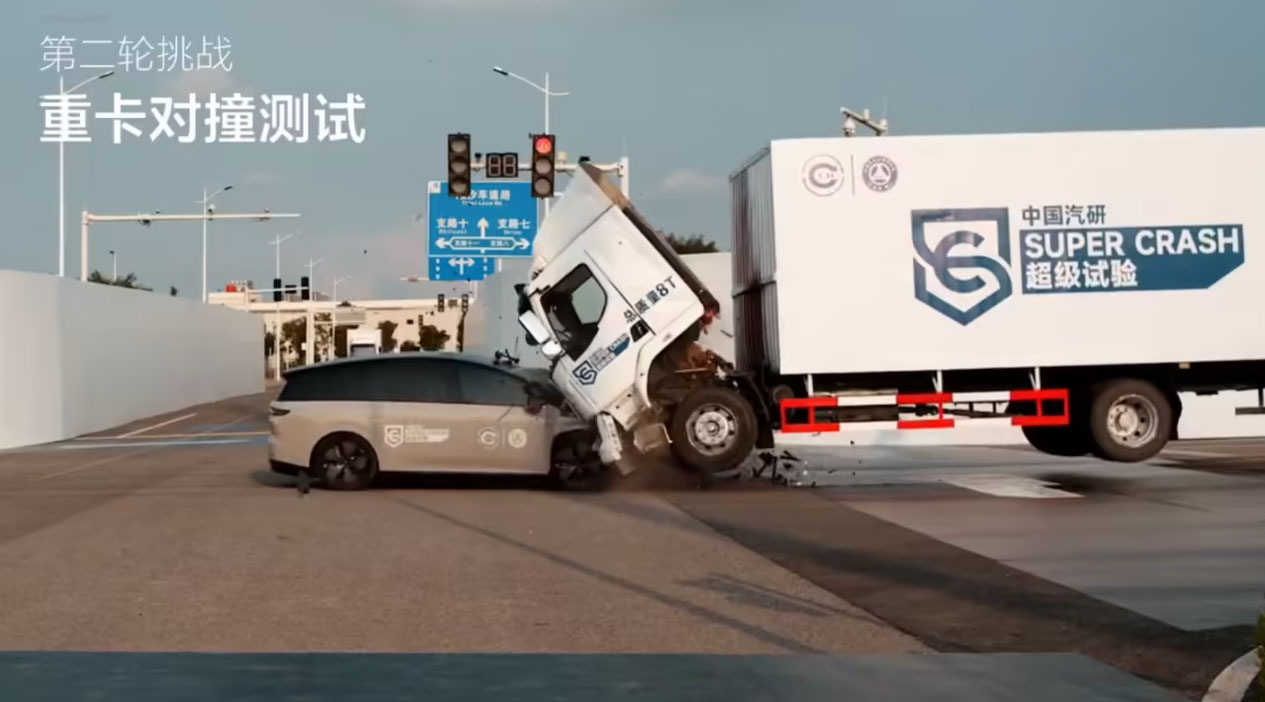Li Auto tries to downplay controversy after i8 crash test embroiled itself and a truck maker
This is the second time Li Auto has been embroiled in a tricky public opinion controversy after the Li Mega MPV's launch.

- This is the second time Li Auto has been embroiled in a tricky public opinion controversy after the Li Mega MPV's launch.
- Li Auto said that this was an unintended action and that it has no direct competition with the truck manufacturer.
Li Auto (NASDAQ: LI) may not have anticipated that the launch of the Li i8 electric SUV (sport utility vehicle) would not only be a disappointing flop but also draw the company into a controversy with a truck maker due to what appeared to be unrealistic marketing claims.
A collision test video shown during the Li i8 launch event on July 29 led to safety concerns about vehicles manufactured by Chinese truck maker Chenglong Truck. In a statement released late last night, Li Auto attempted to downplay the matter.
The purpose of the test was solely to verify and enhance the passive safety performance of the Li i8, and it was not intended to evaluate the product quality of any other brand and the test results should not be interpreted as a judgment on the product quality of another brand, the company said.
"We did not intend for the Dongfeng Liuzhou Chenglong brand to be inadvertently caught up in the controversy caused by the testing process," Li Auto wrote in the statement.
At the launch event for the Li i8, Li Auto shared a video during a live stream watched by millions, showing a Li i8 weighing 2.6 tons surviving a head-on collision with an 8-ton truck.
In the video intended to demonstrate the Li i8's safety, the SUV's A-pillar remained intact after the collision, while the truck's wheels were lifted off the ground and the driver's cabin flipped forward.
The exterior of the truck used in the test did not display any brand information, but the video shared by Li Auto showed the interior, with the logo on the steering wheel indicating that the truck was from Chenglong Truck.
This quickly led to safety concerns for the truck maker, a subsidiary of Dongfeng Liuzhou Automobile, which subsequently responded on Chinese social media, saying that "smart people can tell it's fake at a glance" and that its legal department was handling the matter.
"As a benchmark brand in China's truck industry, Dongfeng Chenglong's quality and safety have always been trusted by truck customers," Li Auto said in its statement.
"Li Auto has no direct competitive relationship with Dongfeng Liuzhou Chenglong. We focus on family passenger vehicles, while the other party is an outstanding representative of China's truck industry and a state-owned enterprise with decades of history. We have always held them in high regard," Li Auto said.
This also drew the China Automotive Engineering Research Institute (CAERI), the entity that conducted the test, into the controversy.
"This test project was solely aimed at verifying the vehicle safety of the Li i8 and was not a standard vehicle-to-vehicle collision test. It does not involve safety evaluations of other vehicle brands," CAERI said in a statement last night.
CAERI said its team randomly purchased a used truck as a moving barrier vehicle and weighted it to 8 tons.
This is the second time Li Auto has been embroiled in a large-scale controversy after the Li Mega MPV (multi-purpose vehicle), marking the challenges it faces in the battery electric vehicle (BEV) sector.
Li Mega, Li Auto's first BEV model, was highly anticipated when it was launched in March 2024, but its subsequent performance has dealt a heavy blow to the company.
The company's management had previously set a monthly sales target of 8,000 units for Li Mega, but the MPV delivered less than 1,000 units in most months.
The launch of the Li i8 coincides with the launch of the L90 flagship SUV by Nio Inc (NYSE: NIO) sub-brand Onvo, and the two models have been widely compared on social media.
The Li i8 starts at RMB 321,800 ($44,770) and deliveries will begin on August 20.
The Onvo L90 was officially launched on July 31, with a starting price of RMB 265,800 including an 85-kWh battery pack. Deliveries began the next day, echoing Li Auto's strategy with multiple models in the past.
($1 = RMB 7.1876)
Disclaimer: The views in this article are from the original Creator and do not represent the views or position of Hawk Insight. The content of the article is for reference, communication and learning only, and does not constitute investment advice. If it involves copyright issues, please contact us for deletion.